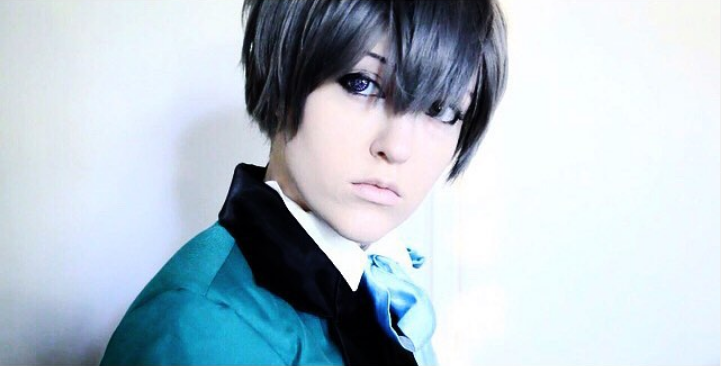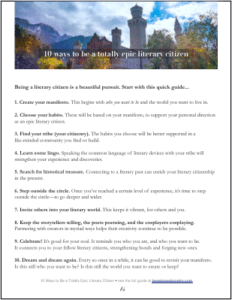What Is Literary Citizenship?
Maybe you’ve heard the concept of being a literary citizen? When I brought it up to my 20-something kids, they weren’t so sure. Hadn’t heard the term. And didn’t have a vision for it. So. That was my invitation to make it epic. (My kids love epic things.)
If you do a quick search on literary citizenship, well, never mind. It originated with a dash of hope and moral flavor in publishing and academic circles, as sort of a “save our ship” or else. (The or else suggesting that books and journals would go away.) The problem is that the concept never really broadened beyond what my kids called it: “power and boringness.” (Ouch!)
Welcome to Tweetspeak, dear literary citizen who wants it to be epic instead. You’ve come to the right (inspiring) place.
Here are 10 ways to be a totally epic literary citizen:
1. Create your manifesto
2. Choose your habits
3. Find your tribe
4. Learn some lingo
5. Search for historical treasure
6. Step outside the circle
7. Invite others into your literary world
8. Keep the storytellers telling
9. Celebrate!
10. Dream and dream again
1. Create your manifesto.
As James Clear, author of Atomic Habits, reminds us, we build the habits we’d like to build because of who we’d like to be. So we start there, with the question of beingness—even before we decide on the nature of our literary citizenship.
Clear further notes that sometimes habits build us, and they aren’t helping to create who we want to be (they just happened, because they were easy and we forgot to reflect on what we might have wished to do differently to align with our epic wishes for ourselves, our family, our world.)
Creating our manifesto doesn’t have to be mundane. The following epic video, for example, communicates an ideal of pursuing knowledge for its own sake. If you count yourself a Ravenclaw, this could form part of your literary citizenship manifesto.
To create your manifesto, you might begin by free writing answers to a few questions:
• What do you believe can make the world better?
• What do you care deeply about?
• Who do you really want to be?
• Where can these beliefs, cares, and wishes intersect with a literary life?
Here at Tweetspeak, we’re keenly aware that the presence of books in the home (and adults who’ll regularly read them aloud) is vital for young readers-to-be. We know that States determine the number of prison beds they’ll be needing, based on the reading scores of children. So we lift up inspiring stories of parents, grandparents, and teachers who help children become readers, because it fits with who we want to be—an organization that helps build strength and beauty, wisdom and freedom, into a life. That’s not the whole of our vision (we need to create our manifesto 😉 ), but it’s one important part.
(The other part might be promoting kindness and empathy in the world. So, Hufflepuff, too. See video below.)
2. Choose your habits.
Let’s say you believe in the power of stories to change lives—that, indeed, your own life has been changed by stories. And, that you want to be a person who discovers (and helps others discover) the most powerful stories in the world. What habits might you want to build, to help you keep life-enriching stories front and center? To help you continue to discover? Or to help others discover? Also, are there habits you might want to put aside, that are getting in the way of being who you want to be in regards to story discovery?
Or, let’s say you believe in the power of poetry to change lives. (We do.) What habits might you want to build, that help you continue to encounter powerful, life-enriching poetry? What habits might you want to put aside? (We read a poem a day, but not ones that have been curated for eliteness or popularity. These are poems chosen especially for their promise to inspire a life, bring insight to our relationships, or stir the heart to greatness of being.)
3. Find your tribe.
Alright, yes, we are mixing metaphors. Citizens. Tribe members. You get the idea. Both help to bring about or keep the world they’d like, for themselves and for those who come after them.
This shouldn’t be about power and boringness (even if it, by necessity, it ends up including a little economics, administrative upkeep, and the making of guidelines to help keep your tribe’s world running smoothly). It will be about finding or making groups that support your desired literary citizen habits. It probably will also be about defining the nature of literary, which is not as cut-and-dried as some people make it out to be.
My younger daughter, who loves stories and is a fabulous storyteller herself, has never found it easy (on her eyes and her sense of physical well-being) to read. Does that mean she can’t be a literary citizen? No way. Instead, she’s found her tribe amidst those who make epic fan videos and pursue beautifully-detailed cosplay. She gets to live the stories she loves, through creating and watching video adaptations and joining others in fantastical roleplay. Some of those stories might surprise a “serious” literary citizen, in just how much the tales rely on classic literature. (Black Butler, for instance, draws on Shakespeare, as well as Victorian conventions and history.)
One could argue that these video editors and cosplayers take stories even more seriously, as they delve deeply into the nuances of character, setting, plot, and themes, to participate in their stories’ worlds.

mishkali, playing Ciel Phantomhive, a character from Black Butler
Here at Tweetspeak, we make sure to provide helpful resources for literary tribe-finding and cultivating. For instance:
• for writers (a weekly writing “tea date”, a Kindle Unlimited freebie on how to create or join a writing group)
• for readers (a monthly book discovery share time and patron book clubs)
• for poetry lovers (the Every Day Poems poetry club, ideas for how to start your own poetry club)
And, of course, our entire site and book catalog aims to poetically inspire individuals and give them what they need to be fuller participants in a literary life, with whomever they choose to pursue that with.
4. Learn some lingo.
When I read The Story of the World to my kids, one of the things we found so fascinating was the pattern of how countries, throughout history, have tried to unify their citizens. One way? By choosing a lingua franca—a common language that everyone would agree to speak especially for commerce and sometimes also in education systems.
As a literary citizen, it can help to “speak the language” of literary devices. Not so you can pass a test. (We think that’s a dismal reason.) But to have, on the tip of your tongue, a way to talk about literature with your tribe. If your tribe is more niche, like with cosplay or fan fiction, it can still be helpful to speak the language of larger literary convention, in order to communicate more broadly about stories and how they’re constructed and what contributes to their impact.
5. Search for historical treasure.
My older daughter’s favorite epic poem is Gilgamesh. She discovered it long ago and even wrote her first persuasive essay (without being assigned to do so), because she felt literature like Gilgamesh was far more enduring—and far more worthy of enduring—than the set of fatalistic literature she was encountering in middle school.
Knowing history’s literature helped her wrap her mind around what it was she didn’t like about the stories she was being asked to read and care about. (She didn’t care about them. And, despite being an avid, avid reader, she often refused to finish them, because she found them too depressing—this, in spite of loving tragedies like Macbeth! Tragedies, she argued in that first persuasive essay, are not fatalistic. They are hopeful because they restore us to ourselves and restore the world to the world. Fancy that.)
On the other hand, she will tell you that Victorian literature gave her a vision for the elaborate writing she loves to do, sometimes combining that with noir techniques she met up with first in a History of Cinema class and later in a Noir Film class. And, an encounter with German Expressionism (also in Cinema class) influenced her adaptation of “The Yellow Wall-Paper” into graphic novel form.
So, while the treasures of history’s literature deepen our literary citizenship, because they connect us to what came before (giving us a sense of belonging to something that transcends us), they can also, if we are writers, give us more to work with than whatever the current trends are serving up.
6. Step outside the circle.
Whatever the nature of our literary citizenship, there’s always the invitation to go deeper and wider. In fact, one might say that a “stay in the lines” citizen is no citizen at all, but just a fading guest of a once-vibrant country. Occasionally stepping outside the lines of what we already know and do means we continue to enhance our being and the world within which we exist.
On a practical level, this can mean trying out new genres, new authors, global literature, and new media. Pursuing literary experiences made for those who are younger or older than us counts, too. (I love a bit of classic Winnie the Pooh, for instance. He is one of the wisest characters I know.)
Step Outside the Circle Video
7. Invite others into your literary world.
One of the saddest things about education, when done poorly, is that it does not rely on invitation but rather on compulsion.
Invitation through inspiration goes a lot further, for bringing others into our literary world, whatever world that might be. My own daughters have invited me into the worlds of fan vidding and cosplay, as an appreciator (to be a practitioner would require educational and social time I’m not ready to give, since my own literary citizenship is currently deeply tied with the work of Tweetspeak; also, I recognize the need for my daughters to have certain worlds that I don’t participate in the way they do).
One proven way to inspire is to demonstrate your own curiosity and delight. Another is to ask beautiful questions.
When we inspire others, we don’t have to rely on compulsion or moralizing. And, if we can’t manage to inspire, it’s a good moment to ask ourselves why.
8. Keep the storytellers telling, the poets poeming, and the cosplayers cosplaying.
Everything takes cognitive resources. Including trying to pay the bills and keep the pantry stocked. Creativity-research now tells us that creative ideas tend to go missing when a person’s cognitive resources get all used up simply in the bid to survive. (Sort of like my garden’s fruits and flowers went missing when I forgot to water it during summer’s height of heat! 😉 )
Encouraging creators whose work we love, partnering with them at a venue like Patreon, and, yes, sometimes buying their work, helps a creator reserve mental resources for the act of creating. Sure, there are historical exceptions, but even in cases of deprivation there was often someone (or multiple someone’s) helping to keep the creator alive.
Consider, too, how a little link love can go a long way. For instance, when I looked for the Gilgamesh link above, I almost linked predictably to Wikipedia. But then I decided to scroll, and scroll again—past search page 3—for something more artistic or fun. Had I not done that, I would have totally missed the chance to introduce you to StoryNory. It’s a wonderful site that’s been around since 2005, and there is no reason for them to be at the very bottom of page 4. So I decided, in this linking case, not to let the Internet rich get richer and the creative, fun, and beautiful get poorer.
9. Celebrate!
Celebration is good for your soul. It reminds you who you are, and who you want to be. It connects you to your fellow literary citizens, strengthening bonds and forging new ones.
Depending on the nature of your literary citizenship, there are lots of ways to celebrate. At Tweetspeak, we actually sponsor public celebration days (and even a whole month), to make group celebration fun and simple. If it suits your style, you could try any one of these:
Sponsored by Tweetspeak
Poetry at Work Day (2nd Tues in January)
Take Your Poet to School Week (first week in April)
Poet in a Cupcake Day (one of my personal favorites; Friday of the first full week in April)
Poetic Earth Month (all of April)
Poem on Your Pillow Day (1st Tues in May)
Take Your Poet to Work Day (3rd Wed in July)
Random Acts of Poetry Day (1st Wed in October)
Get the Epic Literary Citizen Quick Guide now!
For readers, you could join in the festivities with:
World Read Aloud Day (Feb 1)
World Book Day (Mar 4)
World Storytelling Day (Mar 20)
International Literacy Day (Sep 8)
Banned Books Week (Sep 22)
Black Poetry Day (Oct 17)
For writers, you could join in the festivities with:
Thesaurus Day (Jan 18)
National Handwriting Day (Jan 23)
Haiku Poetry Day (Apr 17)
NanoWriMo (all of November)
National Author’s Day (Nov 1)
10. Dream and dream again.
Every so once in a while, it can be good to revisit your manifesto. Is this still who you want to be? Is this still the world you want to create or keep? Or are there other ways of being and doing that might better suit you, given what you’ve been experiencing in the past few years?
Even if you’re still happy with your manifesto, it can also be good to cultivate a few new dreams or strengthen old ones.
For my own part, my kids have tried to inspire me with a dream of France. Maybe someday after quarantine (and if we ever have the means), we might follow that writing and filming dream.
For Tweetspeak, we’re in a new season again, of dreaming the future. We want to support the creation of poetry clubs, so we’ve got a new fiction line we’d like to develop, called The Poetry Club Series. We want to build a bigger digital Arts and Experience library, as a way to invite the next generation into loving classic literature. Maybe we will start a “past page 3 movement,” to encourage linking to less traversed sites, like StoryNory, that are worthy of discovery. Altogether, we’re looking at creating new content that explores the concept of literary citizenship—and offers new resources to help others develop their own.
How about you? Will you dare to “literary citizen dream,” maybe consciously for the very first time—then dream again? It could be an epic journey if you do.
Featured photo by R. Halfpaap, Creative Commons, via Flickr.
New Literary Citizenship Workshop!
Check out the new literary citizenship workshop, taught by wonderful instructor Megan Willome
- Poetry Prompt: In the Wild Secret Place - January 6, 2025
- Journeys: What We Hold in Common - November 4, 2024
- Poetry Prompt: My Poem is an Oasis - August 26, 2024



Will Willingham says
It makes me really happy to see this begin with habits and end with dreams, understanding they are not in conflict but work together, both as great goods. 🙂
L.L. Barkat says
Love that you made that observation.
Indeed, they *do* work together. One might even argue that without habits to support a dream, the dream has about the chance of a chair flying to LA from NY without being put on a plane. 😉
Asare Yohannes says
I have many poems I want to share on tweakspeak
L.L. Barkat says
We invite you to write with our community (which is how we share our poems here, over time).
For more info, check it out:
https://www.tweetspeakpoetry.com/submissions/
Donna Hilbert says
Thank you for the inspiration!
L.L. Barkat says
You are very welcome, Donna. 🙂
We’d love to hear about anything you try from this, going forward. (And also, about your journey so far, if you’d be open to sharing.)